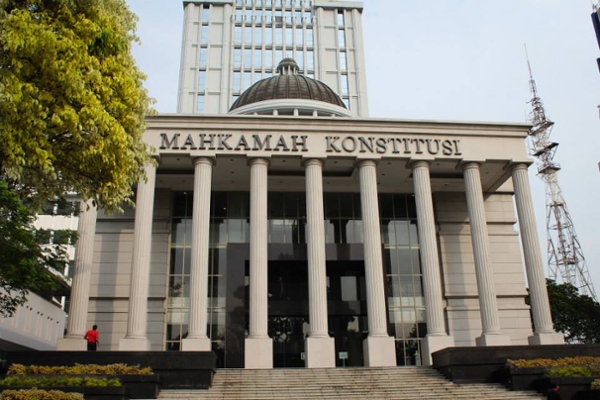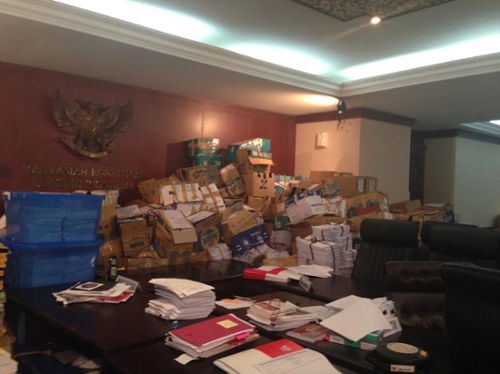Mahkamah Konstitusi
Before the Andalas International Conference on Eradicating Corruption concluded, I boarded a flight with Mamá and Papá for Jakarta to begin the second phase of my internship at Mahkamah Konstitusi (the Constitutional Court), otherwise known as MK (pronounced “eMKa”). On Saturday, I attended my first Indonesian wedding, and on Sunday I settled in to my overpriced, cockroach-infested dormitory. Monday marked my first day at MK.

I spent the entire morning on the first day of my internship waiting to be summoned to the Secretary General’s office. One of the secretaries finally came to get me at 12:00pm, and sat me down in the waiting room where I stared at a wall for another three hours. Eventually the Secretary General emerged from his office, introduced himself (his name is Janedjri Gaffar), asked me to wait for him until he got back from his meetings, and then he disappeared into the elevator. Hours later, his secretaries apologized when it was clear that our meeting would have to be postponed until the next day. I finally met the Secretary General in the afternoon of my second day, along with an English teacher, who was there for his weekly lessons. Mr. Sec Gen (as everyone here calls him) is quite charismatic and constantly smiling as he lights one golden foil-wrapped cigarette after another. After generic introductions were made, Mr. Sec Gen wasted no time in asking me to discuss Marbury v. Madison. He explained that MK was founded on the principle of judicial review established in Marbury, and he was eager to hear about it from an American’s perspective. I couldn’t help but think that my Con Law professor would be thrilled.
When it was clear that Mr. Sec Gen’s staff had not come up with an official agenda for me, I began to meet with various MK employees independently. From them, I learned about the ongoing DPR election disputes. As I explained before, DPR stands for Dewan Perwakilan Rakyat, which is the Indonesian equivalent of our House of Representatives. Every five years, new provincial representatives are elected from among the twelve national political parties (however the procedure is a little different in special provinces like Aceh). The concept of election hearings was introduced to the constitution during the last amendment, which took place in 2003. For MK to hear an election dispute case, political parties or Regional Representative Council candidates may request an annulment of the election results. The claim must state that there was a miscalculation of the election ballots, and the petitioners must provide what they perceive as the correct calculation. MK reviews these claims for every general election. This year, the court received 914 cases of election disputes following the legislative elections, which took place on April 9, 2014. On average, each party filed complaints concerning 48 cases. The court rejected 217 of the lawsuits due to absence of evidence, missed deadlines, etc. To determine whether the signatures on the ballots were forged, each political party sends their version of the ballots, which are compared with the ballots that were counted by the government. The MK employees look at the signatures, compare them, and then ask witnesses to verify that the signature on the ballot is indeed theirs. I didn’t realize how involved this process could really be until I saw the file room, which is crammed with boxes filled with hand-written ballots from the each voter in every province, one set for each petitioning political party. MK only has 30 days to resolve the disputes, so, needless to say, the whole building was crazed.
During this time, MK employees are required to work from 8:00am-10:00pm on Monday through Friday and 8:00am-5:00pm on Saturdays and Sundays for three months. Even if the employees finish their work ahead of time, they may not leave. A fingerprint scanner at the employee entrance, which records their check-in and checkout times, monitors their hours, preventing them from leaving even a minute early. As my new friend Indah gave me a tour around MK, I saw thin mattresses wedged between desks and plenty of overworked employees who going through their designated tasks like zombies. Most of the time, I leave at 5:00pm, but once I stayed until 8:00pm, and the building was deserted. Employees here will leave for hours at a time, and only come back to check out at 10:00pm. Those who stay are watching soap operas or finding some other way to keep their drooping eyelids open. On days like these, the work can be completed during regular business hours, but on other days, employees may feel compelled to work through the night. I even spoke to one person who is actually living in MK. Thankfully, this three-month process only happens every five years. To make matters worse, traffic in Jakarta is the worst I’ve ever seen. Unlike in the U.S., where the traffic is usually only problematic during rush hour, the traffic here is constant; thus, it generally takes the employees roughly two hours to get home because they live in suburbs outside of the city. Luckily, it only takes me 45 minutes to reach my dorm, which is 2.8 miles away.

